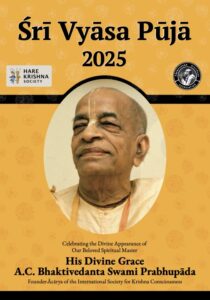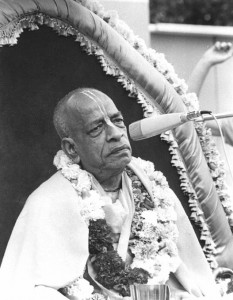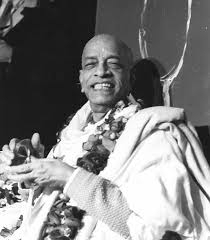Adi 17.90–One day the Lord ordered Śrīvāsa Ṭhākura to read the Bṛhat-sahasra-nāma [the thousand names of Lord Viṣṇu], for He wanted to hear them at that time.
Adi 17.91-As he read the thousand names of the Lord, in due course the holy name of Lord Nṛsiṁha appeared. When Caitanya Mahāprabhu heard the holy name of Lord Nṛsiṁha, He became fully absorbed in thought.
Adi 17.92–In the mood of Lord Nṛsiṁhadeva, Lord Caitanya ran through the city streets, club in hand, ready to kill all the atheists.
Adi 17.93–Seeing Him appearing very fierce in the ecstasy of Lord Nṛsiṁha, people ran from the street and fled here and there, afraid of His anger.
Adi 17.94-Seeing the people so afraid, the Lord came to His external senses and thus returned to the house of Śrīvāsa Ṭhākura and threw away the club.
Adi 17.99-On another day a great devotee of Lord Śiva, chanting of Lord Śiva’s qualities, came to Lord Caitanya’s house, where he began dancing in the courtyard and playing his ḍamaru [a musical instrument].
Adi 17.100–Then Lord Caitanya, adopting the mood of Lord Śiva, got on the man’s shoulders, and thus they danced together for a long time.
Adi 17.101-On another day a mendicant came to beg alms from the Lord’s house, but when he saw the Lord dancing, he also began to dance.
Adi 17.102-He danced with the Lord because he was favored by love of Kṛṣṇa. Thus he flowed in the mellows of love of Godhead.
Adi 17.103–On another day an astrologer came who was supposed to know everything-past, present and future. Thus Śrī Caitanya Mahāprabhu received him with all honor and put this question before him.
PURPORT
Brāhmaṇas generally used to become astrologers, Āyur-vedic physicians, teachers and priests. Although highly learned and respectable, such brāhmaṇas went from door to door to distribute their knowledge. A brāhmaṇa would first go to a householder’s home to give information about the functions to be performed on a particular tithi, or date, but if there were sickness in the family, the family members would consult the brāhmaṇa as a physician, and the brāhmaṇa would give instruction and some medicine. Often, since the brāhmaṇas were expert in astrology, people would also be greatly inquisitive about their past, present and future.
Although the brāhmaṇa appeared at Lord Caitanya’s house as a beggar, Lord Caitanya Mahāprabhu received him with great respect because he was a qualified brāhmaṇa who knew the astrological science perfectly. Although brāhmaṇas would go door to door just like beggars, they were honored as very respectable guests. This was the system in Hindu society five hundred years ago, during the time of Caitanya Mahāprabhu. This system was current even one hundred years ago; even fifty or sixty years ago, when we were children, such brāhmaṇas would visit householders like humble beggars, and people would derive great benefit from the mercy of such brāhmaṇas. The greatest benefit was that a householder could save a great deal of money from being spent on doctor bills because the brāhmaṇas, aside from explaining the past, present and future, could ordinarily cure all kinds of diseases simply by giving instructions and some medicine. Thus no one was bereft of the benefit of a first-class physician, astrologer and priest.
Adi 17.104-“Please tell Me who I was in My previous birth,” the Lord said. “Please tell Me by your astrological computations.” Hearing the words of the Lord, the astrologer immediately began to calculate.
PURPORT-Through astrology one can know past, present and future. Modern Western astrologers have no knowledge of the past or future, nor can they perfectly say anything about the present. Herein we find, however, that after hearing Śrī Caitanya Mahāprabhu’s order, the astrologer immediately began his calculations. This was not a facade; he actually knew how to ascertain one’s past life through astrology. A still-existing treatise called the Bhṛgu-saṁhitā describes a system by which anyone can immediately get information about what he was in the past and what he is going to be in the future. The brāhmaṇas who went door to door as if beggars had perfect command of such vast knowledge. Thus the highest knowledge was easily available even to the poorest man in society. The poorest man could inquire from an astrologer about his past, present and future, with no need for business agreements or exorbitant payments. The brāhmaṇa would give him all the benefit of his knowledge without asking remuneration, and the poor man, in return, would offer a handful of rice, or anything he had in his possession, to satisfy the brāhmaṇa. In a perfect human society, perfect knowledge in any science-medical, astrological, ecclesiastical and so on-is available even to the poorest man, with no anxiety over payment. In the present day, however, no one can get justice, medical treatment, astrological help or ecclesiastical enlightenment without money, and since people are generally poor, they are bereft of the benefits of all these great sciences
Adi 17.109-Through calculation and meditation, the all-knowing astrologer saw the greatly effulgent body of the Lord, which is the resting place of all the unlimited Vaikuṇṭha planets.
PURPORT…The astrologer saw Śrī Caitanya Mahāprabhu to be the very same Personality of Godhead. We can just imagine how learned he was, yet he was traveling door to door, just like an ordinary beggar, for the highest benefit of human society.
Adi 17.110-When the astrologer was speaking so highly of Him, Śrī Caitanya Mahāprabhu stopped him and began to smile. “My dear sir,” He said, “I think you do not know very clearly what I was, for I know that in My previous birth I was a cowherd boy.
Adi 17.111-“In My last birth I was born in the family of cowherd men, and I gave protection to the calves and cows. Because of such pious activities, I have now become the son of a brāhmaṇa.”
PURPORT-The words of Lord Caitanya Mahāprabhu, the greatest authority, herein clearly indicate that one becomes pious simply by keeping cows and protecting them. Unfortunately, people have become such rascals that they do not even care about the words of an authority. People generally consider cowherd men lowly members of society, but herein Caitanya Mahāprabhu confirms that they are so pious that in their next lives they are going to be brāhmaṇas. The caste system has a specific purpose. If this scientific system is followed, human society will get the greatest benefit. Heeding this instruction by the Lord, people should serve cows and calves and in return get ample quantities of milk. There is no loss in serving the cows and calves, but modern human society has become so degraded that instead of giving protection to the cows and serving them, people are killing them. How can they expect peace and prosperity in human society while committing such sinful activities? It is impossible.
Some Conclusions– Here in just one small part of CC mention is given of 4 different days in Caitanya Lila. One part I like is where the brahmana astrologer gives his forecast for Lord Gauranga and sees by meditation that He is the Supreme Personality of Godhead and tells Him so. But Lord Gauranga tells him jokingly that no He is not God but simply because he protected cows in His past life he now got to take birth in a brahmanas family. By the Vedic system of Varnashram one generally progresses up the social ladder birth after birth from one varna to the next. But Lord Caitanya explains that protecting cows is so pious he skipped the ksatriya varna and went straight to a brahmanas birth from a vaisya birth.
Hare Krsna
damaghosa das



